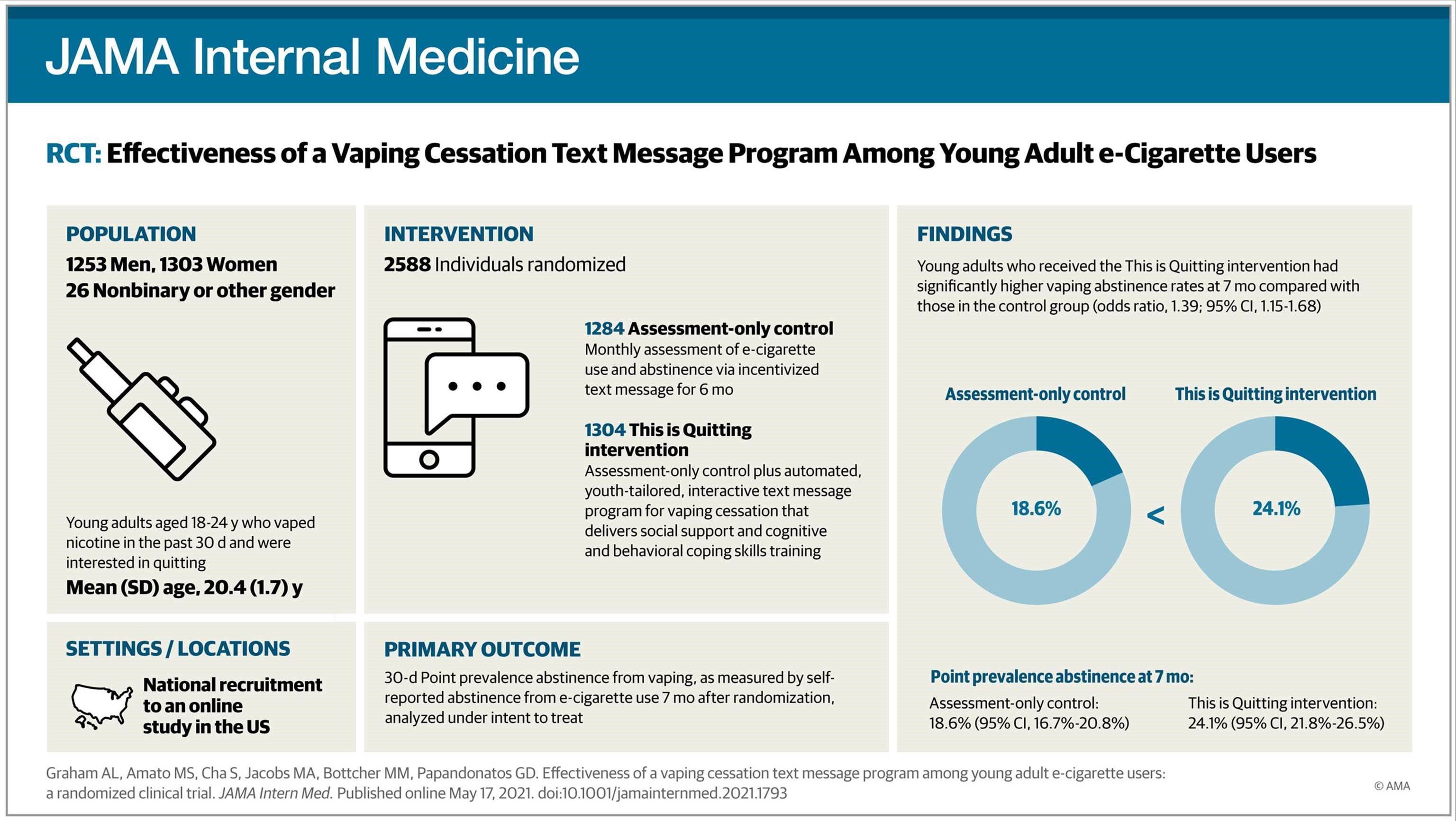Clinical trial: Text message program increases quit rates among young adult e-cigarette users by nearly 40%
A randomized clinical trial found that young adults aged 18-24 who used This is Quitting had nearly 40% higher odds of quitting compared to a control group.
The Truth Initiative research demonstrates the effectiveness of This is Quitting in helping young adults between 18 and 24 years old quit vaping. Launched in January 2019, This is Quitting was created specifically for teens and young adults looking to quit e-cigarettes. The free and anonymous text message program has enrolled over 325,000 young people to date, providing them with tailored advice, cognitive and behavioral coping strategies, and social support to help them quit.
[Text “DITCHVAPE” to 88709 to enroll in This is Quitting.]
The study reports significantly higher quit rates after seven months in e-cigarette users who received support from This is Quitting (24.1%) versus the control group (18.6%). Researchers found that participants enrolled in This is Quitting also had higher quitting rates regardless of age, race, ethnicity, gender, sexual orientation, nicotine dependence, social influences to vape, and other substance use.
The results come at a time when e-cigarette use among young people remains at epidemic levels, and public health organizations have called for research on e-cigarette cessation programs. The 2019 CDC National Health Interview Survey found that 9.3% of young adults ages 18-24 used e-cigarettes, up from 7.6% in 2018, and over half (56%) of the young adult e-cigarette users reported that they had never smoked cigarettes.
The nicotine found in most e-cigarettes can expose young people to negative health effects around brain development – which continues up to age 25 – including an increased risk of nicotine addiction and mood disorders. A separate Truth Initiative survey of young e-cigarette users between 15 and 24 years old found that 60% want to quit within the year and, of those who want to quit, more than half (51.2%) agreed that texting would help them stop vaping.

Filling a critical gap in the research
Despite the high rates of vaping and strong demand for quitting vaping programs among young people, there is limited research on how to help young adults quit vaping.
Researchers conducted a double-blind, randomized clinical trial among 2,588 e-cigarette users ages 18-24 from December 2019 to November 2020. Participants – all of whom were past 30-day e-cigarette users and interested in quitting vaping in the next month – were randomly enrolled in either This is Quitting or a control group that did not receive an intervention. Researchers followed up with participants one and seven months later to ask if participants had vaped at all in the past month.
The overwhelming majority of participants -- 93.1% -- vaped nicotine daily and 82.3% reported vaping within 30 minutes of waking. Most of the participants had previously tried to quit vaping, with 91.4% reporting an attempt in the past year, and 65.4% reporting three or more quit attempts. Previous Truth Initiative research published in Preventive Medicine Reports shows a majority of current young e-cigarette users surveyed say they intend to quit, with one-third reporting a past-year quit attempt and 15% aiming to quit in the next month.
Moving forward with digital quit programs
Digital quit-vaping programs build on the background and strategies of similar programs for quitting smoking. Mobile phone-based programs have been proven effective for long-term smoking cessation and are effective among young adults, according to a recent review. And almost all young adults (99%) own mobile phones and prefer texting.
The new study shows that text messaging is a scalable and cost-efficient approach to promote quitting e-cigarettes among young adult users. “These results establish a benchmark of effectiveness for other vaping cessation programs and begin to fill an important gap in understanding how to help young people quit e-cigarettes,” the study authors write.
More in quitting smoking / vaping
Want support quitting? Join EX Program
By clicking JOIN, you agree to the Terms, Text Message Terms and Privacy Policy.
Msg&Data rates may apply; msgs are automated.



